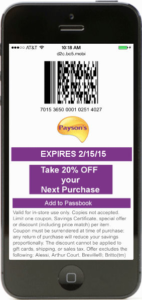For many retailers,
mobile coupons and
promotion text messages are good business. Consumers routinely search for mobile coupons, and are also more responsive than ever to promotion text messages. As the mobile phone is quickly becoming the hub of engagement, delivering offers to a consumer’s mobile device only makes sense. For retailers ready to take the next step, following are 10 reasons why mobile coupons and promotion text messages work.
#1. Consistent Consumer Experience.
Since consumers are not wed to a particular channel, they should have the option to view and redeem their mobile coupons in the channel of their choosing (SMS, retailer’s app, Passbook, mobile web, email, etc.). The key to a consistent experience is ensuring that mobile coupons look the same, behaves the same, and expires in all the channels a consumer has chosen to view it – whether it’s a link in a promotion text message, or on a mobile website.

#2. Single-Use Coupons.
Unlike paper coupons (obtained from a free standing insert, or printed from an email or internet coupon portal),
single-use coupons can be deployed ensuring they are redeemed only once. Even if the consumer deletes the mobile coupon from their mobile device, they will receive the original coupon when attempting to retrieve it a second time. The key to single-use mobile coupons is the underlying security model.
#3. High Redemption Rates.
It is widely recognized that mobile coupons redemption redeem at significantly higher numbers than paper coupons. On average, CodeBroker
retail customers experience mobile coupons redemption rates between 3-10% for mobile coupons delivered via promotion text messages, and between 30-50% for on-demand promotions. Redemption rates for coupons obtained from a free standing insert are between .5 and 2%.
#4. Simultaneous Expiration.
As noted in Consistent Consumer Experience, mobile coupons should behave the same in all channels. This includes expiring the offer in all of the channels the consumer viewed the coupon via promotion text mesages, retailer’s app, Passbook, mobile web, email, etc. Simultaneous expiration frees the retailer to deliver high value mobile coupons knowing it can be redeemed only once.
#5. Mark-as-redeemed.
Following recognition of the coupon code by the POS system, the mobile coupon is marked-as-redeemed. Essentially, the mobile coupon has been “collected” at the time of purchase and is no longer available for use. Marking mobile coupons as redeemed informs the consumer that the mobile coupon cannot be re-presented at check-out creating an improved experience.
#6. Purchase Funnel Visibility.
Retailers are able to track who received mobile coupons, who viewed them, and which consumers redeemed mobile coupons. A comprehensive picture of each campaign provides the retailer with insight into the entire purchase funnel. This valuable information can be used to measure the success of a mobile coupon marketing campaign as well as better target future offers.
#7. Eliminate Fraud.
A cookie-based mobile coupon security system can be easily defeated. Worst case scenario is when instructions to defeat the model are posted on the web, costing retailers up to tens of thousands of dollars per day. Using CodeBroker’s unique
security model (not based on cookies), a retailer’s mobile coupon fraud rate can be reduced to zero.
#8. Convenience.
If you’re a retailer that provides multiple coupons for consumers to use at any given time, a digital coupon wallet is a great way for consumers to keep track of all of their offers in a single location. No more forgetting a coupon in the glove compartment of the car or on the kitchen counter as consumer’s always have their mobile device (and offers) with them.
#9. Dynamic Passes.
Mobile coupons are the number one item consumers store in Passbook (Flagship Research). CodeBroker’s unique ability to support dynamic passes means thatmobile coupons are updated every time a consumer accesses the pass – whether it’s the first time it is loaded into Passbook, any time it is viewed or when it is redeemed. Once the Pass expires or redeemed, it is updated accordingly letting the consumer know not to present it during checkout a second time.
#10. Faster Checkout.
When mobile coupons are used in the store, during checkout the coupon code is either scanned, in the form of a barcode, or entered into the POS by the cashier. For retailers that employ barcode scanners, checkout time is substantially decreased.
All of these capabilities are possible due to the unique security model built into CodeBroker’s coupon software. The ability to link a coupon code to a consumer provides a number of benefits to both the retailer and consumer. The retailer has access to a wealth of information as well as mobile coupon fraud and liability protection and the consumer has a much improved shopping experience that leads to increased brand loyalty. There’s no question mobile coupons are good business for retailers.


